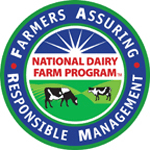A report issued today about the National Dairy FARM Animal Care Program found that overall, its subscribers are doing a thorough job of adhering to its multi-faceted approach to comprehensive dairy animal well-being.

Voluntary, and open to all producers in the United States, Farmers Assuring Responsible Management (FARM) is a national set of guidelines designed to demonstrate dairy farmers' commitment to outstanding animal care and a quality milk supply. Cooperatives, proprietary milk processors, and individual dairy producers are using the program to assure consumers that the food they purchase is produced with integrity.
Since enrollment began in September 2010, the FARM Animal Care Program has been implemented on dairy farms accounting for 41 percent of the nation's milk supply. With continued expansion of enrollment, participation in the FARM program is anticipated to exceed 70 percent of the nation's milk supply in 2013, the National Milk Producers Federation (NMPF) said today.
Participating producers are provided comprehensive training materials and undergo an on-farm evaluation conducted by a trained veterinarian, extension educator, co-op field staff member, or other FARM-trained professional. Evaluators then provide a status report and, if necessary, recommendations for on-farm improvement.
In June 2012, data collected from the more than 5,000 second-party evaluations made of the dairy operations enrolled in FARM program was reviewed and analyzed to determine the effectiveness of on-farm implementation. A summary of those results was made available today.

"While we're seeing near nearly universal adoption of the best practices from the FARM animal care manual," said Jamie Jonker, Vice President of Scientific and Regulatory Affairs at NMPF, "some specific practices have not achieved the same level of adoption as others. This demonstrates the importance of continuous improvement and on-going education as advocated by the program."
Jonker cited several examples of where adherence is greatest, as well as where improvements are needed:
99.2% of farm operators engage in dairy animal observations to identify any potential health issues;
99% of farm operators train personnel to handle and restrain calves with a minimum of stress to the animal;
95.5% of farm operators train personnel in proper methods to move non-ambulatory animals;
Meanwhile:
72.7% of farm operators have emergency plans to address animal care needs stemming from unique circumstances such as a natural disaster;
68% of farm operators apply antiseptic to the navels of calves after birth as a preventative health measure.
To protect the integrity and credibility of the program, the FARM program utilizes an independent third-party process to ensure that its practices are being appropriately adopted and the educational materials and methodologies used in training both farm operators and evaluators is sound and effective. Each year, a nationwide sample of dairy farms in the program is randomly selected for visits from third-party "verifiers" to assure (to a 95% confidence interval) that the observations recorded during the second-party evaluations are valid. Validus, an Iowa-based certified auditing company with more than 10 years of experience with farm animal care programs, is used to conduct the third-party verification process.
The initial third-party verification of the FARM program was conducted in 2011, with analysis of that process completed earlier this year. This analysis confirmed that effective implementation of the FARM program is occurring through producer education and on-farm evaluation. The objective third-party verification for 2012 is currently underway.
"This check the checkers' analysis compares the data collected from the second-party, on-farm evaluations with the third-party, on-farm verification data. This assures that the on-farm evaluations are being consistently conducted across all dairy farm participants," Jonker added. "The findings of the third-party verification confirm the validity and integrity of the FARM program."
The National Milk Producers Federation, based in Arlington, VA, develops and carries out policies that advance the well-being of dairy producers and the cooperatives they own. The members of NMPF's 30 cooperatives produce the majority of the U.S. milk supply, making NMPF the voice of more than 32,000 dairy producers on Capitol Hill and with government agencies. Visit www.nmpf.org for more information.
10.25.2012